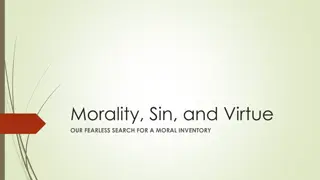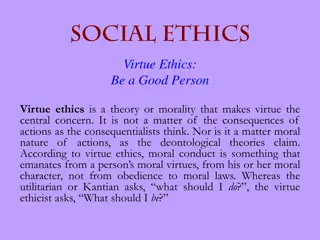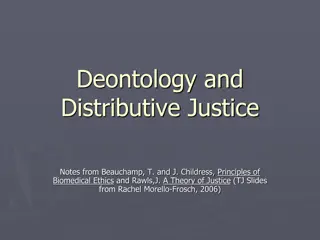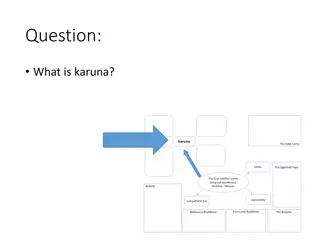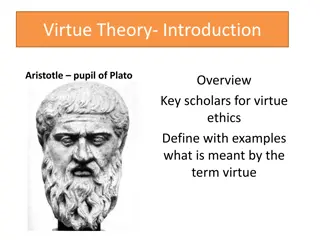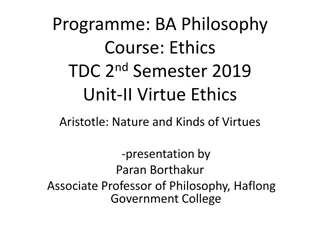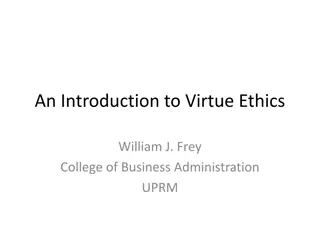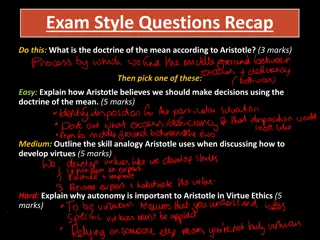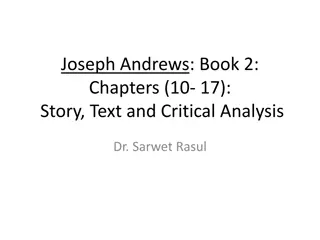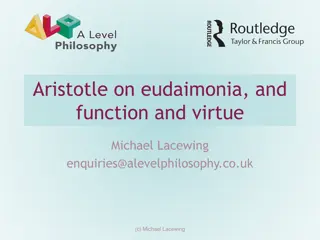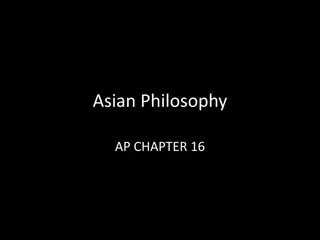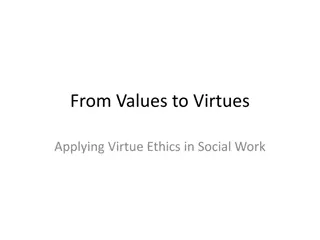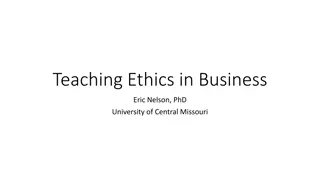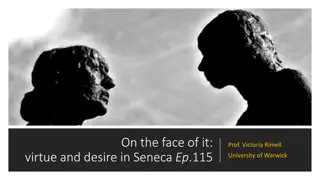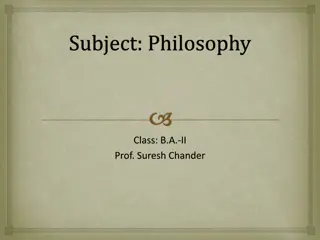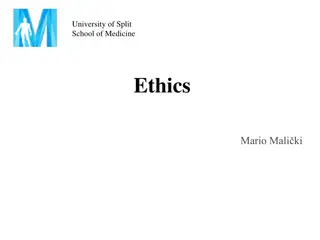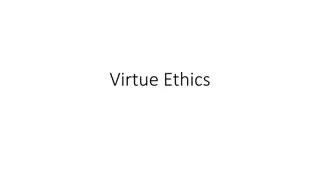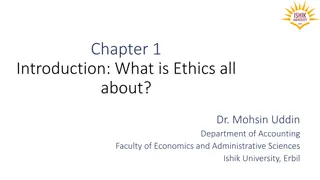Understanding Human Values, Ethics, and Ethical Frameworks
Human values and ethics play a crucial role in guiding individual behavior and decision-making. Human values encompass aspects such as respect, integrity, responsibility, fairness, compassion, honesty, trustworthiness, and cooperation. Ethics provide broader guidelines for determining right and wron
3 views • 7 slides
Exploring Ethics: Branches, Theories, and Moral Dilemmas
Ethics delve into Meta Ethics, Normative Ethics, and Applied Ethics to understand moral concepts and decision-making. The discourse covers various ethical theories like Absolutism, Relativism, Subjectivism, and explores the difference between Teleological and Deontological decision-making. Thought-p
5 views • 14 slides
Understanding Business Ethics Management at Libyan International University
Explore the essentiality of business ethics, employee management ethics, and the foundation of managerial ethics, crucial for a successful business. Learn about ethical hiring practices, training in ethics, strong codes of ethics, and more at the Faculty of Business Administration, Libyan Internatio
0 views • 12 slides
Ethical Studies Course Overview and Activities
Delve into the world of Ethical Studies with this comprehensive course overview. Explore themes like Ethical Language and Thought, Natural Law, Situation Ethics, and more. Engage in activities like Virtue Ethics starters, fortune line graphs, and discussions on moral dilemmas. Dive into the principl
0 views • 17 slides
Understanding Ethics: Foundations and Principles
Ethics, a cornerstone of human behavior, encompasses descriptive, normative, and meta ethical aspects. It delves into the nature of ethics, its definition, and the essence of ethical judgment. Ethics evaluates conduct against moral ideals, aiming to guide moral judgments and actions with regard to t
0 views • 6 slides
Exploring Morality, Sin, and Virtue: A Journey of Self-Discovery
Dive into the profound exploration of morality, sin, and virtue, uncovering the essence of self-reflection and ethical understanding. From delving into the definitions of these concepts to understanding the nature of sin and virtue, embark on a transformative path towards enlightenment and inner gro
1 views • 22 slides
Introduction to ABA, Ethics, & Core Principles: A Paradigm Overview
This chapter provides a historical context of approaches to ethical behavior in behavior analysis. It discusses theoretical conflicts, the importance of consequences, and reviews dominant paradigms in clinical ethics such as virtue ethics, consequentialism, and deontology. It explores the concept of
0 views • 38 slides
Understanding Virtue Ethics in Aristotle's Philosophy
Virtue ethics places virtue at the center of morality, emphasizing moral character over obeying laws or focusing on consequences. Aristotle's influence on virtue ethics is significant, highlighting the importance of striving to be a virtuous person whose actions stem from a virtuous character. Accor
6 views • 24 slides
Understanding the Code of Ethics in Professional Practice
Ethics play a crucial role in leadership and professionalism. This content discusses the definition of ethics, the difference between morals and ethics, and the importance of adhering to the Academy's Code of Ethics for Dietetic Practitioners. It highlights the expectations, duties to the public, an
0 views • 22 slides
Deontology and Distributive Justice in Ethics
Deontology, rooted in the concept of duty, focuses on morally required, forbidden, or permitted choices. It emphasizes obedience to duty, opposing utilitarian claims. Unlike virtue theories, deontology prioritizes what is right over an overall conception of good. Immanuel Kant's categorical imperati
0 views • 32 slides
Understanding Human Values, Ethics, and Ethical Frameworks
Human values and ethics play crucial roles in guiding human behavior and decision-making. Values such as respect, integrity, responsibility, fairness, compassion, honesty, trustworthiness, and cooperation are fundamental in shaping individual interactions with others and society. Ethics provide broa
1 views • 7 slides
Understanding Karuna in Buddhist Philosophy
Karuna, a key virtue in Mahayana Buddhism, emphasizes recognizing and alleviating the suffering of others. Bodhisattvas exemplify this virtue through selflessness, while figures like Amitabha Buddha embody compassion through acts like welcoming believers to Sukhavati. The concept of karuna is closel
0 views • 14 slides
Understanding the Neuroscience of Habituated Motivation in Virtue Cultivation
Exploring the intersection of Aristotelian theory, cognitive neuroscience, and moral philosophy, this research delves into the conditions and mechanisms underlying the cultivation of virtuous habits through apprenticeship. By leveraging diverse expertise in philosophy, neuroscience, and cognitive sc
2 views • 21 slides
School Official Ethics: An Update as of December 1, 2015
The School Ethics Act, effective since April 1992, ensures that members of local boards of education and administrators maintain public trust. Established by the School Ethics Commission (SEC), it involves a Code of Ethics, Conflict of Interest Disclosures, and Training Requirements. SEC oversees et
2 views • 47 slides
Importance of Ethics in Professional Practice
Ethics play a crucial role in guiding behavior and decision-making in professional settings. While laws set certain standards, ethics go beyond mere legality to define what is morally acceptable. Teaching ethics is essential, as shown by research in various fields such as public accounting. Codes of
0 views • 24 slides
Seminar on Truth, Trust, and Cooperation in Translation Ethics
Dive into the complexities of translation ethics by exploring concepts from Berman's textual ethics and Pym's ethics in the context of real-world translation practices. Reflect on the genre-dependent nature of ethics in translation and contemplate the translator's role in today's multicultural lands
1 views • 26 slides
Ethical Theories: Divine Command vs. Virtue Theory Explained
Divine Command Theory asserts that morality is derived from God's commands, contrasting with Virtue Theory which focuses on developing moral virtues to achieve human flourishing and excellence. Divine Command Theory relies on religious texts, while Virtue Theory emphasizes the cultivation of virtues
0 views • 24 slides
Understanding Virtue Ethics and Aristotle's Virtue Theory
Delve into the world of Virtue Ethics with a focus on Aristotle's Virtue Theory, exploring the concept of virtue, key scholars in virtue ethics, and the development of virtues. Discover the Golden Mean, Eudaimonia, and the Beatitudes in relation to virtue theory, alongside discussions on moral decis
0 views • 21 slides
Aristotle's Virtue Ethics: The Nature and Kinds of Virtues
Aristotle's virtue ethics discusses the nature of virtues as a disposition unique to humans that enables them to function well according to reason. Virtue involves finding the mean between excess and deficiency, not endorsing mediocrity. It emphasizes that virtues are acquired through habitual pract
1 views • 18 slides
Exploring Virtue Ethics and Human Flourishing
Delve into the realm of virtue ethics, uncovering the significance of moral education, self-excellence, and rethinking traditional moral theories. Learn how virtues shape our actions, character, and perception of ethical dilemmas, ultimately leading to human fulfillment and happiness.
1 views • 21 slides
Understanding Aristotle's Doctrine of the Mean and Voluntary Actions
Explore Aristotle's doctrine of the mean, the skill analogy used in developing virtues, the importance of autonomy in virtue ethics, and the distinction between voluntary and involuntary actions in moral responsibility as discussed in his Nicomachean Ethics.
0 views • 22 slides
Exploring Civic Virtue and Institutional Design in Early Modern Governance
Delve into the complexities of civic virtue and institutional design in early modern governance through a 3,000-word essay. Analyze the necessity of civic virtue within the state and consider contrasting perspectives on whether institutional design can replace it. Use primary texts to support your a
0 views • 32 slides
Analysis of Selfishness and Virtue in Chapters 10-11 of Joseph Andrews
The text from Chapter 10 of Joseph Andrews explores themes of selfishness, materialism, and virtue as a group confronts the aftermath of an adventure. The characters argue over their shares of an 80-pound reward, revealing their self-serving nature. The chapter delves into the motivations and action
0 views • 41 slides
Enhancing Integrity in Water Services Trust Fund for Improved Access to Water and Sanitation
Explore the importance of integrity and ethics in the Water Services Trust Fund for enhancing access to water and sanitation. Delve into concepts of integrity, ethics, and the detrimental effects of corruption. Learn from historical philosophers on virtue and wisdom and how they relate to ethical co
0 views • 13 slides
Understanding Aristotle's Concept of Eudaimonia and Virtue
Aristotle's philosophy delves into the concept of eudaimonia, which is not mere pleasure or wealth but the state of living well and flourishing. Eudaimonia is achieved through the exercise of virtues, qualities that aid in fulfilling one's function or characteristic activity. This pursuit of eudaimo
0 views • 10 slides
Understanding Confucius: Key Concepts and Philosophical Ideals
Confucius, born during the Zhou Dynasty, emphasized virtue, social reform, and humanism in his teachings. He focused on values like Ren (human-heartedness) and key concepts such as De (virtue) and Li (propriety). By studying human practices, he sought to achieve goodness and harmony. Explore the phi
0 views • 23 slides
Applying Virtue Ethics in Social Work: From Values to Virtues
Exploring the application of virtue ethics in social work, this content delves into the transition from foundational values to virtuous character traits. It discusses the importance of moral qualities, virtues, and practical wisdom in making ethically informed decisions. Highlighted are the perspect
0 views • 14 slides
Overview of House Code of Conduct, Ethics Committee, and Ethics Procedures
The overview covers the House Code of Conduct focusing on principles of democracy, Ethics Committee membership and procedures for handling complaints, and the jurisdiction of the Ethics Committee, including behavior that could lead to discipline. It also outlines House Rule 6.10 for complaints regar
0 views • 11 slides
Virtue Ethics in Bigelow's Films: A Moral Exploration
The discussion delves into the virtue ethics portrayed in Kathryn Bigelow's films "The Hurt Locker" and "Zero Dark Thirty." It raises questions on the ethics of actions taken in the war on terror, particularly the controversy surrounding the depiction of torture as crucial in the killing of Bin Lade
0 views • 12 slides
Teaching Business Ethics: Perspectives and Decision-Making
Understanding ethics in business involves exploring different perspectives such as Utilitarianism, Rights-Based, Kantian, and Virtue ethics. Decision-making based on these perspectives requires considering the impact on stakeholders, weighing pros and cons, and aligning personal values with organiza
0 views • 8 slides
Exploring Virtue and Desire in Seneca's Philosophy
Seneca presents a nuanced version of Stoicism, allowing for human interaction and love while emphasizing the purity of love separate from bodily desires. Through Seneca's writings, the distinction between love and desire is made clear, touching on themes of body, mind, desire, and veneration. The in
0 views • 15 slides
Exploring the Interplay of Ethics, Virtue, and Humanity in Philosophy
Delve into the origin and essence of ethics, the cultivation of virtues, and the intrinsic connection between ethics, aesthetics, psychology, religion, and philosophy. Discover the profound influence of character traits, moral principles, and the pursuit of goodness on human conduct and societal val
0 views • 35 slides
Ethics in Computer Technology: Impact and Considerations
Explore the effects of computer technology on social interaction and ethics, evaluating tradeoffs, professional codes of ethics, digital intellectual property, and privacy solutions. Recommended resources and assignments on ethics and plagiarism are provided, along with objectives on organizational
0 views • 18 slides
Exploring Applied Medical Ethics and Ethical Dilemmas in Healthcare
Delve into the realm of applied medical ethics with Dr. Deepthi Edussuriya, a senior lecturer, as you learn to identify ethical considerations and evaluate approaches to solving ethical dilemmas in medical practice. Understand the principles approach and the use of philosophical methods to determine
0 views • 37 slides
Ethics and Integrity in Medicine: A Comprehensive Overview
Explore the ethical principles, moral excellence, and ethical approaches in the field of medicine. Delve into the importance of upholding professional conduct, maintaining integrity, and adhering to ethical codes such as the WMA International Code of Medical Ethics. Learn about the significance of v
0 views • 39 slides
Philosophy and Ethics A Level Overview: Religion, Ethics, and Christian Thought
This is an A Level overview of Philosophy and Ethics, focusing on topics such as Philosophy of Religion, Religious Ethics, and Developments in Christian thought. Students will explore concepts like the existence of God, moral issues, ethics, and more, challenging their intellectual capabilities and
0 views • 10 slides
Insights into Virtue Ethics and Critiques of Kantian Morality by Philippa Foot
Philippa Foot, a key figure in the modern revival of Aristotle's virtue ethics, critiques the Kantian approach to morality. She emphasizes the importance of motivation in cultivating virtues, arguing that feeling bound by morality stems from wanting to lead a flourishing life. Through her works, Foo
0 views • 14 slides
Critique of Ethical Schools: A Comparative Analysis
This article explores three main ethical schools - utilitarianism, deontology, and virtue theory - and delves into their distinct emphases and elements. It highlights the differences in how each school views lying and ethical decision-making. Additionally, it discusses the incorporation of ethical p
0 views • 45 slides
Forms of Moral Reasoning and Ethics in Decision-Making
Explore the main forms of moral reasoning in ethical decision-making, including virtue ethics, deontological reasoning, and teleological reasoning. Understand the importance of developing ethical virtues and principles in guiding behavior. Delve into examples of reasoning from virtue and deontologic
0 views • 28 slides
Understanding the Relationship Between Ethics and Law
Ethics, derived from Greek ethos and Latin mores, focuses on rightfulness and wrongfulness in human actions for ultimate happiness. It pertains to good or bad behavior, values, honesty, and moral principles. Ethics pertains to voluntary actions, deals with human conduct, and serves as guiding standa
0 views • 14 slides





